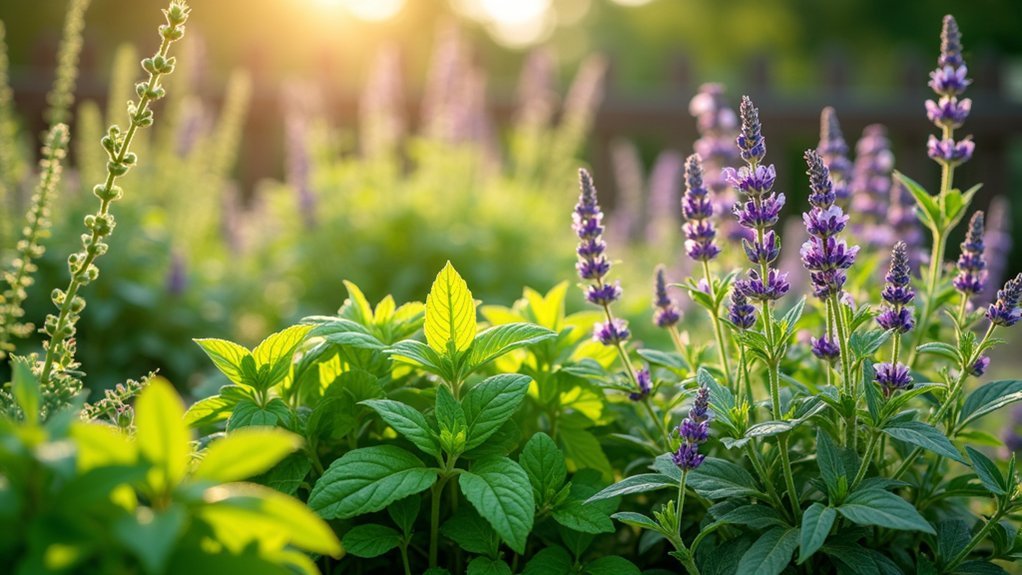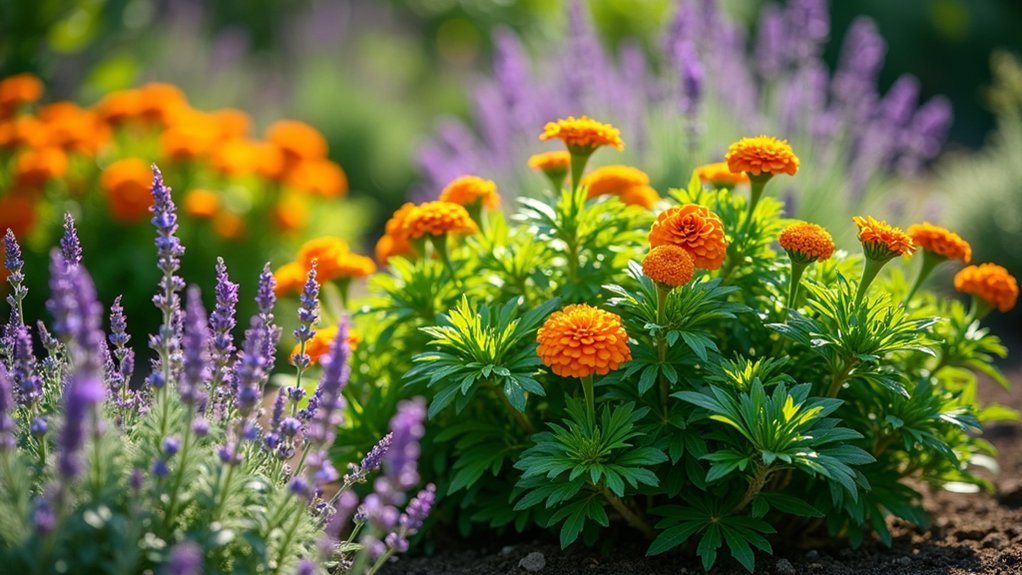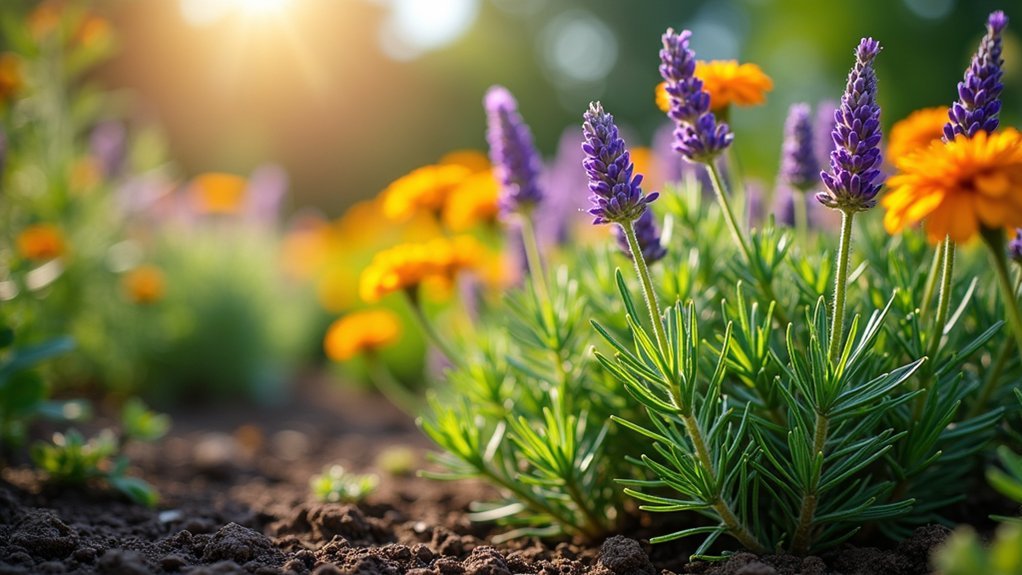Plants repel mosquitoes through their essential oils, which contain volatile compounds that disrupt mosquitoes’ ability to detect you. When you crush or bruise a plant’s leaves, these natural repellent chemicals release into the air. Not all plants are equally effective – catmint, citronella, lavender, marigolds, and allium rank among the top defenders. For maximum protection, strategically place these plants around your outdoor living spaces and activate their properties regularly. Discover which mosquito-fighting plants will thrive in your garden zone.
The Science Behind Plant-Based Mosquito Deterrents

While many gardeners swear by their mosquito-repelling plants, the scientific evidence tells a more nuanced story.
The science behind these natural deterrents involves volatile compounds found in essential oils that interfere with a mosquito’s ability to locate you rather than creating an invisible barrier.
Research shows that plants that repel mosquitoes don’t release enough of these compounds in their natural state to considerably affect mosquito behavior. The protective chemicals typically remain trapped within the plant’s tissues.
When scientists test mosquito repellency, they use concentrated oils and extracts—not whole plants.
This explains why crushing or bruising leaves increases effectiveness; you’re manually releasing those essential oils.
Unfortunately, even when released, these compounds evaporate quickly, limiting their practical protection time in garden settings.
Top 5 Flowering Plants That Naturally Repel Mosquitoes
You’ll find the most potent mosquito-repelling plants ranked by their effectiveness in the following guide, with citronella geranium and lavender leading the pack.
Cultivating these natural deterrents doesn’t require a green thumb—even beginners can successfully grow marigolds and floss flowers with minimal effort.
From hardy perennials to easy-care annuals, these flowering plants offer dual benefits of beautiful blooms and mosquito protection in your outdoor spaces.
Repelling Power Rankings
These five flowering plants stand out as nature’s most effective mosquito deterrents, combining beauty with practical pest control. When ranking mosquito repellent capabilities, catmint emerges as the clear champion, offering protection ten times more powerful than commercial DEET products.
| Plant | Repelling Power | USDA Zones | Key Feature |
|---|---|---|---|
| Catmint | Exceptional (10x DEET) | 3-8 | Most powerful natural repellent |
| Allium | Very High | 3-8 | Dual culinary and pest control |
| Citronella Geranium | High | 9-11 | Commercial repellent source |
| Lavender | Moderate-High | 5-11 | Calming for humans, repels mosquitoes |
| Marigold | Moderate | 5-10 | Easy to grow in most gardens |
Cultivation Made Simple
Growing these five mosquito-repelling plants requires minimal gardening expertise, making them perfect additions to any outdoor space.
You’ll find citronella geranium thrives with basic care in zones 9-11, offering its powerful lemon scent that mosquitoes avoid.
Marigolds provide continuous blooms from late spring until frost—simply place them near patios to repel unwanted pests.
Lavender delivers double benefits: it soothes humans while deterring mosquitoes, and its drought resistance makes maintenance easy in zones 5-11.
For containers or garden beds, basil needs only full sun and consistent moisture to release its mosquito-fighting fragrance.
Perhaps most impressive is catmint, which outperforms DEET tenfold according to studies.
Plant it once and enjoy mosquito protection from early summer through fall, though be mindful of its spreading tendency.
Herb Garden Defenders: Aromatic Plants Mosquitoes Hate

While many gardeners focus primarily on visual appeal or culinary uses, aromatic herbs offer an additional hidden benefit: natural mosquito protection. Your herb garden can double as a line of defense against these persistent pests.
Lavender, rosemary, and basil emit powerful scents that mosquitoes actively avoid. Surprisingly, catmint stands out among these aromatic plants, proving ten times more effective than DEET in repelling mosquitoes. Mint also performs double duty, deterring not just mosquitoes but flies and ants as well.
For immediate relief, try crushing herb leaves to release their essential oils. You can apply these oils topically for temporary protection.
While these mosquito repellants enhance your garden’s functionality and beauty, remember their effectiveness varies—don’t rely solely on herbs for complete mosquito control.
Strategic Plant Placement for Maximum Mosquito Protection
Create an effective perimeter defense by positioning mosquito-repelling plants like marigolds and citronella grass around the edges of your outdoor living spaces.
You’ll maximize protection by implementing layered planting techniques, placing taller repellent plants behind shorter varieties to create concentrated zones of deterrence.
Establishing dedicated patio protection zones with groupings of aromatic herbs and flowers will help shield the areas where you spend the most time outdoors.
Effective Perimeter Defense
Strategic placement of mosquito-repellent plants forms your yard’s first line of defense against these persistent pests. By establishing a living barrier with marigolds, citronella, and lavender around your property’s edge, you’ll keep mosquitoes at bay before they reach your outdoor living areas. Unlike artificial mosquito traps, these plants do contain natural compounds that mosquitoes find offensive.
Position these fragrant guardians near doorways, windows, and patio spaces for enhanced protection where you need it most. For peak effectiveness, group aromatic varieties like rosemary and basil together, creating pockets of intensified repellent power.
Remember to maintain proper spacing between plants, as overcrowding can reduce their effectiveness. Regular pruning and watering guarantee your perimeter defenders release ideal amounts of mosquito-deterring oils, maintaining a natural shield around your outdoor sanctuary.
Layered Planting Techniques
Beyond establishing a strong perimeter defense, the art of layered planting elevates your mosquito protection strategy to new heights. By strategically positioning mosquito plants near entry points and seating areas, you’ll create natural barriers mosquitoes avoid.
| Plant Combination | Location | Benefit |
|---|---|---|
| Citronella & Basil | Patios/Decks | Height variation with dual repelling properties |
| Marigolds & Lavender | Windows/Doors | Colorful barrier with complementary scents |
| Rosemary & Catmint | Garden Beds | Enhanced repellent effect through grouping plants |
Maximize effectiveness by combining taller plants like citronella grass with shorter herbs such as basil, creating both visual appeal and mosquito protection. Consider adding carnivorous pitcher plants to actively trap mosquitoes while maintaining your layered arrangement. Regular pruning and ensuring proper drainage will keep your mosquito-repelling garden thriving all season.
Patio Protection Zones
When designing your outdoor living areas, establishing dedicated patio protection zones can transform your mosquito defense strategy from scattered plants to a systematic barrier.
Strategic placement of mosquito-repellent plants like marigolds and citronella geraniums around your patio’s perimeter creates an effective buffer against these persistent pests.
Position lavender and rosemary near seating areas to both beautify your space and reduce mosquito landings where you’ll spend the most time.
For maximum effectiveness, combine flowering and aromatic plants such as basil and mint to release varying scents that deter different mosquito species.
Remember to maintain proper spacing between plants in your patio protection zone, allowing each to thrive and produce the essential oils that make them effective repellents.
Regular pruning and care guarantee your natural mosquito barrier remains strong throughout the outdoor season.
How to Activate a Plant’s Mosquito-Repelling Properties
Most mosquito-repelling plants won’t simply ward off insects by their mere presence in your garden. To activate a plant’s mosquito-repelling properties, you’ll need to release the essential oils they contain through physical manipulation.
For peak effectiveness:
- Crush or bruise the leaves gently between your fingers to release their natural oils.
- Harvest during peak growth periods when oil concentration is highest.
- Prune regularly to stimulate new growth and enhanced oil production.
Place your activated plants strategically near seating areas for better protection.
When working with plant extracts, verify you’re growing varieties in ideal conditions—sunny spots with good drainage will produce healthier plants with stronger repellent compounds.
Combining these techniques with proper plant maintenance creates a more powerful mosquito deterrent throughout your outdoor spaces.
Beyond Citronella: Lesser-Known Mosquito-Deterring Plants

While Citronella gets most of the attention, you’ll find unexpected allies like Catmint, which studies show is ten times more effective than DEET at repelling mosquitoes.
Your garden’s aromatic defenders also include Lavender, which disrupts mosquitoes’ ability to smell, and pungent Alliums that mosquitoes particularly dislike.
Don’t overlook flowering options like Marigolds and Bee Balm, which not only deter mosquitoes but also attract beneficial insects to create a balanced outdoor ecosystem.
Surprising Garden Defenders
Although citronella takes center stage in mosquito-repelling conversations, your garden likely harbors several unsung heroes that pack an even stronger defensive punch.
Catmint, surprisingly, repels mosquitoes ten times more effectively than citronella, according to Brooklyn Botanic Garden studies.
You’ll find these plants not only beautiful but functional:
- Floss Flower contains coumarin, a powerful mosquito-repelling chemical perfect for containers.
- Allium species (garlic and onions) emit strong scents mosquitoes avoid while serving dual purposes in cooking.
- Bee Balm attracts beneficial insects while its crushed leaves release oils that repel insects.
Don’t overlook mint—this perennial powerhouse deters mosquitoes, flies, and ants while thriving in pots for easy access.
These plants listed provide natural protection without harsh chemicals.
Aromatic Bug Barriers
Beyond the garden defenders mentioned above, your yard can become a powerful mosquito-free zone with strategic planting of aromatic barriers. While citronella gets all the fame, you’ll be surprised to learn that catmint provides ten times more mosquito-repelling power according to Brooklyn Botanic Garden studies.
| Plant | Mosquito Deterrent Power | Additional Benefits |
|---|---|---|
| Catmint | 10x more effective than citronella | Attracts beneficial pollinators |
| Lavender | Disrupts mosquito’s ability to smell | Beautiful fragrance and blooms |
| Marigold | Long-lasting protection until frost | Deters multiple garden pests |
| Rosemary | Thrives in hot, dry conditions | Culinary herb with woody scent |
These aromatic plants work through their essential oils, creating invisible but powerful barriers. When planting, crush some leaves occasionally to release more oils, particularly with bee balm, enhancing their effectiveness as natural mosquito repellents.
Creating a Mosquito Barrier With Layered Plantings
Strategic plant layering in your garden serves as a powerful deterrent against mosquitoes by disrupting their flight patterns and creating confusion through varied scents.
When making a barrier with mosquito-repelling plants, consider both height and fragrance diversity. Position taller plants like alliums at the back and shorter herbs like mint in front to maximize your defensive layout.
Layered plantings work best when you:
- Combine perennials and annuals for continuous protection throughout growing seasons
- Incorporate varied textures and scents like citronella grass and marigolds to confuse mosquitoes
- Arrange plants densely to block flight paths toward outdoor living areas
This multi-dimensional approach creates a complex environment that’s difficult for mosquitoes to navigate, considerably reducing their presence around your patio and garden spaces.
Seasonal Effectiveness of Mosquito-Repelling Plants
While mosquito-repelling plants can considerably reduce pest activity in your garden, their effectiveness fluctuates throughout the year based on seasonal factors.
You’ll notice peak performance during warm summer months when mosquitoes are most active and plants release more of their repellent compounds.
In colder seasons, the potency of these natural repellents diminishes as chemical compounds degrade in lower temperatures.
Plants like citronella, lavender, and marigolds require consistent care to maintain their repellent properties year-round.
Their effectiveness depends on blooming cycles, with summer-flowering varieties offering stronger protection during that period.
For maximum protection, consider how environmental factors impact your mosquito-repelling plants’ performance.
As seasons change, you’ll need to adjust your approach to mosquito control, potentially supplementing plants with other methods during less effective periods.
Container Gardens for Mosquito Control on Patios and Decks
Creating compact container gardens on your patio or deck offers an elegant solution for mosquito control without sacrificing style or space.
Transform your outdoor living space into a mosquito-free haven with stylish container gardens that blend beauty and function.
Position containers strategically around seating areas to form a natural barrier against these pesky insects. Herbs like basil and rosemary pull double duty—offering both culinary benefits and mosquito-repelling properties through their aromatic oils.
For maximum effectiveness:
- Select a variety of mosquito-repelling plants like citronella, lavender, and marigolds.
- Arrange containers to create a protective perimeter around outdoor living spaces.
- Check containers regularly to eliminate standing water, which serves as breeding grounds.
You’ll enjoy the flexibility of container gardens, allowing you to experiment with different plant combinations while maintaining an attractive outdoor space that naturally deters mosquitoes.
Companion Planting: Boosting Your Garden’s Mosquito Resistance
Beyond their individual repelling properties, plants work even better as mosquito deterrents when thoughtfully combined throughout your garden. Companion planting creates natural barriers against pests while promoting biodiversity in your outdoor space.
| Plant Pairing | Benefits | Repels |
|---|---|---|
| Marigolds & Tomatoes | Prevents nematodes | Mosquitoes, aphids |
| Basil & Peppers | Enhances flavor, growth | Mosquitoes, flies |
| Citronella & Roses | Masks attractive scents | Mosquitoes, thrips |
You’ll notice increased effectiveness when you strategically position mosquito-repelling plants alongside vulnerable varieties. This approach doesn’t just deter unwanted pests—it actively attracts beneficial insects that further maintain your garden’s ecological balance. The synergistic relationship between companion plants creates a more potent mosquito defense than any single plant can provide alone.
Extracting and Using Natural Plant Oils for Enhanced Protection
Although whole mosquito-repelling plants offer protection in your garden, extracting their essential oils reveals considerably higher concentrations of repellent compounds.
While garden plants deter mosquitoes, their extracted essential oils pack a far more potent protective punch.
You’ll find that plant extracts and oils like citronella, eucalyptus, and rosemary contain powerful active ingredients that function as natural insect repellent alternatives.
To effectively harness these natural protectors:
- Extract oils through steam distillation or cold pressing for maximum potency
- Create diluted sprays following safety guidelines and testing for skin sensitivity first
- Reapply frequently since the volatile compounds evaporate quickly
Remember that plant varieties produce different concentrations of repellent compounds—catmint extracts have even outperformed DEET in some studies.
You can apply these oils topically or use them in diffusers, giving you versatile protection options beyond what garden plants alone provide.
Combining Plants With Other Natural Mosquito Control Methods
While mosquito-repelling plants provide a solid foundation for pest control, you’ll achieve considerably better results by implementing a multi-faceted approach.
Start by eliminating standing water and cleaning gutters, then strategically place mosquito-repelling plants throughout your outdoor spaces.
For enhanced protection, install outdoor fans near seating areas—mosquitoes struggle to fly in breezy conditions.
Complement your plant strategy by adding mosquito traps to capture adult insects before they can reproduce. You’ll find that combining plants with these methods creates a more thorough defense system.
Consider planting non-attractive flowers like marigolds alongside your repellent varieties.
While natural repellents extracted from plants offer temporary relief, don’t abandon EPA-registered products for sustained protection, especially during peak mosquito season.
Frequently Asked Questions
What Plants Actually Repel Mosquitoes?
While living plants aren’t effective mosquito repellents, you’ll get better results by crushing or extracting oils from citronella, marigolds, lavender, and rosemary. EPA-approved repellents are your most reliable protection against mosquitoes.
Why Are Mosquitoes Attracted to My Plants?
Mosquitoes are attracted to your plants because they emit strong scents, provide standing water in pots, release carbon dioxide, and may have night-blooming flowers. They’re drawn to bright blooms seeking nectar too.
Do Coffee Grounds Keep Mosquitoes Away?
Coffee grounds can help repel mosquitoes with their strong scent. You’ll get the best results when burning them, as the smoke deters these pests. They’re not a complete solution, but they’ll provide some protection.
How Effective Is Plant-Based Mosquito Repellent?
Plant-based mosquito repellents can be effective, but they’re typically less potent than synthetic options like DEET. You’ll get better results from concentrated oils and extracts rather than relying on whole plants in your garden.
In Summary
You’ve now got a complete toolkit for transforming your outdoor space into a mosquito-resistant haven. By strategically placing these aromatic plants throughout your garden, you’ll naturally repel these pesky insects while creating a beautiful, fragrant environment. Don’t forget to activate your plants’ repelling properties and combine them with other natural methods for the most effective protection. You’ll soon enjoy bite-free evenings in your garden sanctuary.





Leave a Reply